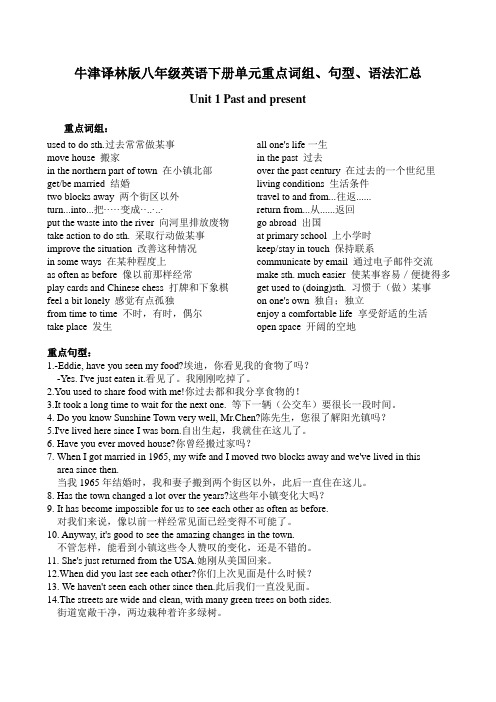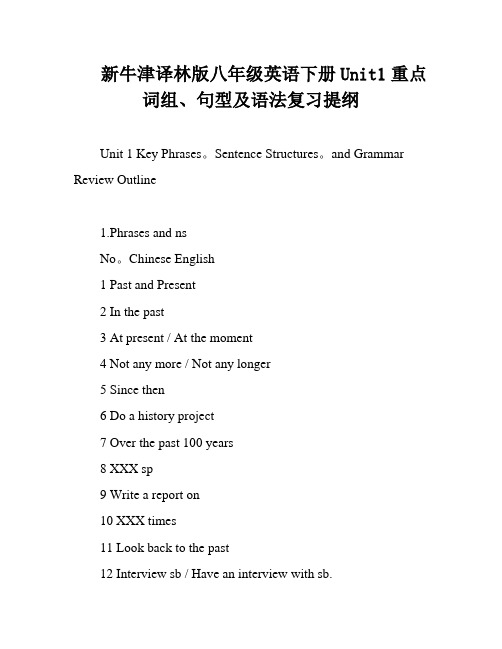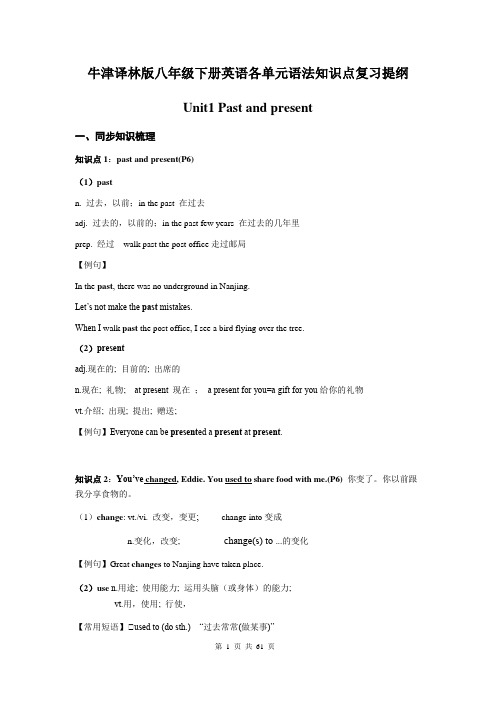译林版初中英语八年级下册全册Units1--8单元重点短语、句型、语法整理
2020-2021学年牛津译林版八年级英语下册单元重点词组、句型、语法汇总(Units1-8)

牛津译林版八年级英语下册单元重点词组、句型、语法汇总Unit 1 Past and present重点词组:used to do sth.过去常常做某事move house 搬家in the northern part of town 在小镇北部get/be married 结婚two blocks away 两个街区以外turn...into...把·····变成··..·..·put the waste into the river 向河里排放废物take action to do sth. 采取行动做某事improve the situation 改善这种情况in some ways 在某种程度上as often as before 像以前那样经常play cards and Chinese chess 打牌和下象棋feel a bit lonely 感觉有点孤独from time to time 不时,有时,偶尔take place 发生all one's life一生in the past 过去over the past century 在过去的一个世纪里living conditions 生活条件travel to and from...往返......return from...从......返回go abroad 出国at primary school 上小学时keep/stay in touch 保持联系communicate by email 通过电子邮件交流make sth. much easier 使某事容易/便捷得多get used to (doing)sth. 习惯于(做)某事on one's own 独自;独立enjoy a comfortable life 享受舒适的生活open space 开阔的空地重点句型:1.-Eddie, have you seen my food?埃迪,你看见我的食物了吗?-Yes. I've just eaten it.看见了。
译林版英语八年级下重点语法详解

译林版英语八年级下重点语法详解八年级下UNIT1现在完成时的重点和难点一、现在完成时的“完成用法”和“未完成用法”1.现在完成时的"完成用法"现在完成时的"完成用法"指的是动作发生在过去某一时刻并已结束,但该动作对现在产生了影响,与现在情况具有因果关系。
例如:He has turned off the light.他已把灯关了。
(动作结束于过去,但说明的是现在的情况--灯现在不亮了。
) 现在完成时"完成用法"的特点是动作不延续,因此,该时态只能与表示不定的过去时间状语(如:already,yet,before,recently等)、频度时间状语(如:never,ever,once等)、包括现在时刻在内的时间状语(如:this morning/month/year...,today等)连用。
例如:Have you found your pen yet?你已找到你的钢笔了吗?2.现在完成时的"未完成用法"现在完成时的"未完成用法"指的是动作开始于过去某一时刻,一直延续到现在,或可能还要继续下去。
例如:He has lived here since 1978.自从1978年以来,他一直住在这儿。
(动作起始于1978年,一直住到现在,可能还要继续住下去。
)I have been in the army for more than 5 years.我在部队已经呆了五年多了。
(动作开始于5年前,一直连续至今,有可能还要连续下去。
)此种用法的句中常需一个表示一段时间的状语(由since或for引导),或表示与现在时刻相连的时间状语(如:up to now,so far到目前为止)等。
例如:I have heard nothing from him up to now.到目前为止我没有他的任何消息。
注意:(1)现在完成时的未完成用法只适用于延续性动词,不可用于终止性动词,即瞬间完成或延续时间很短的动词。
新牛津译林版八年级英语下册Unit1重点词组、句型及语法复习提纲

新牛津译林版八年级英语下册Unit1重点词组、句型及语法复习提纲Unit 1 Key Phrases。
Sentence Structures。
and Grammar Review Outline1.Phrases and nsNo。
Chinese English1 Past and Present2 In the past3 At present / At the moment4 Not any more / Not any longer5 Since then6 Do a history project7 Over the past 100 years8 XXX sp9 Write a report on10 XXX times11 Look back to the past12 Interview sb / Have an interview with sb.13 XXX14 Move to/into/out of/away15 In the southern part of China16 A marry B / A be/get married to B / A and B get married17 Have been to/have gone to/have been in sp.18 In fact19 Great changes20 XXX into a park / Change into a park21 Miss my old friends22 Play cards and Chinese chess23 Take off (clothes)24 XXX25 XXX.26 Used to do / Used to be27 Be used to doing28 Be used to do sth29 Dump into30 XXX31 XXX2.Sentence StructuresSimple present tense: Subject + VerbPresent continuous XXX: Subject + be + Verb + -ingSimple past XXX: Subject + Verb + -ed/2nd formPast continuous tense: Subject + was/were + Verb + -ingPresent perfect tense: Subject + have/has + Verb + -ed/3rd formPast perfect XXX: Subject + had + Verb + -ed/3rd formFuture XXX: Subject + will/shall + VerbPassive voice: Object + be + Verb + -ed/3rd form + (by + subject)XXX: Reporting verb + (that) + subject + Verb3.GrammarArticles (a/an/the)XXX)Adverbs (often/always/never/sometimes)Adjectives (big/small/great/happy)XXX)XXX)Modal verbs (can/could/may/might/must/will/would/should) XXX)XXX)Gerunds and infinitives (Verb + -ing/to + Verb)32.In some ways。
牛津译林英语八年级下册全册(Unit1-8)知识点汇总

牛津译林英语八年级下册全册知识点汇总8B Unit11.I've just eaten it.我刷才把它吃了。
just作副词“刚刚,刚才”,通常与现在完成时连用。
Mr Wang has just left our classroom. 王老师刚刚离开我们的教室。
I've just heard the news. 我刚听到这个消息。
①just副词“正好,恰好”,常与名词、名词性短语或句子连用,起加强语气的作用。
This jacket is just my size. 这件夫克衫正合我的尺码。
②just now“刚才,刚刚”=a moment ago,常用于句末。
I met one of my friends in the street just now.我刚才在衡上遇到了我的一个朋友。
③just then“就在那时”。
Just then,someone knocked at the front door. 就在那时,有人在前门敲门。
2.You've changed,Eddie.埃迪,你变了。
①change不及物动词“变化”,过去分词changedThe city has changed a lot since 2000. 这个城市自从2000年以来变化很大。
In England,the weather changes very often. 在英格兰,天气时常变化。
②change及物动词“交换;改变;换乘”。
Can I change seats with you? 我可以和你换一下座位吗?At last,he changed his mind. 最后,他改变了主意。
I stopped in Moscow only to change planes. 我为了转机才在莫斯科停留的。
③change可数名词“改变,变化,转变”;不可数名词“零钱”。
Great changes have taken place in this city since 1984.自从1984年以来,这个城市已发生了很大的变化。
牛津译林版八年级下册英语各单元语法知识点复习提纲(全面!)

牛津译林版八年级下册英语各单元语法知识点复习提纲Unit1 Past and present一、同步知识梳理知识点1:past and present(P6)(1)pastn. 过去,以前;in the past 在过去adj. 过去的,以前的;in the past few years 在过去的几年里prep. 经过walk past the post office走过邮局【例句】In the past, there was no underground in Nanjing.Let’s not make the past mistakes.When I walk past the post office, I see a bird flying over the tree.(2)presentadj.现在的; 目前的; 出席的n.现在; 礼物; at present 现在;a present for you=a gift for you给你的礼物vt.介绍; 出现; 提出; 赠送;【例句】Everyone can be present ed a present at present.知识点2:You’ve changed, Eddie. You used to share food with me.(P6) 你变了。
你以前跟我分享食物的。
(1)change: vt./vi. 改变,变更; change into变成n.变化,改变; change(s) to ...的变化【例句】Great changes to Nanjing have taken place.(2)use n.用途; 使用能力; 运用头脑(或身体)的能力;vt.用,使用; 行使,【常用短语】①used to (do sth.) “过去常常(做某事)”批注:否定形式:didn’t use to / usedn’t to①get/be used to(doing sth. )“习惯于(做某事)【例句】He used to go fishing every Saturday. But since he changed his job, he’s barely(几乎不) had a chance. He thinks he’ll never be used to this busy lifestyle.【拓展】useful adj. 有用的;useless adj. 无用的知识点3:I first lived in the northern part of the town with my parents.(P8)【例句】Beijing is in the northern part of China.批注:注意in the north与in the northern part of 的同义句转换。
牛津译林版八年级英语下册Unit1-Unit 8 全册词汇、语法知识点梳理

牛津译林版八年级英语下册Unit1-Unit 8 全册词汇、语法知识点梳理将下列词组或短语英汉互译。
1. get married _________2. used to ____________3. from time to time _____4. such as ___________5. 把……变成_________6. 在某种程度上;在某些方面____7. 一生______8. 保持联系_______9. the capital of ... _________10. a couple of _____________11. at high speed ________12. on the way __________13. 在……的末尾_________14. 出差_________________15. 习惯于;适应于_________16. 顺便问一下___________将下列句子翻译成英语。
1. 他过去经常去河里游泳。
___________________________________2. 我已经习惯了在这里生活。
___________________________________3. 我哥哥不在家,他去图书馆了。
___________________________________4. 他们离开上海一年了。
___________________________________5. 我保证你会喜欢我的礼物的。
___________________________________考点一:现在完成时的基本用法现在完成时表示从过去持续到现在的动作或状态,或已完成但对现在有一定影响的动作。
它的结构是“主语+have / has+ 动词过去分词+其他”。
常和already、ever、just、never、recently、yet 等副词以及since 和for 引导的时间状语连用。
考点二:动词的过去分词的变化规律大多数动词的过去分词变化形式与动词的过去式相同。
牛津译林版八年级英语下册单元重点词组,句型、语法汇总

牛津译林版八年级英语下册单元重点词组,句型、语法汇总
- 第一单元:
- 重点词组:
- I've just eaten it. 我刚刚把它吃了。
- 重点句型:
- used to do sth. 意为“过去常常做某事/以前经常做某事/曾经做某事”,表示过去的习惯。
- 第二单元:
- 重点词组:
- over the years 多年来
- 重点句型:
- It is/has been+时间段+since+一般过去时。
- 第三单元:
- 重点词组:
- married/divorced/single 已婚的/离婚的/单身的
- 重点句型:
- 疑问词+动词不定式
- 第四单元:
- 重点词组:
- be full of 充满
- 重点句型:
- so that 以便,为了
- 第五单元:
- 重点词组:
- as a result 结果
- 重点句型:
- 现在完成时
- 第六单元:
- 重点词组:
- interview sb. about sth. 就某事采访某人- 重点句型:
- It is+形容词+to do sth.
- 第七单元:
- 重点词组:
- return to sp. 回到某地
- 重点句型:
- 现在完成时
- 第八单元:
- 重点词组:
- primary school 小学
- 重点句型:
- 祈使句。
Units 1-8重要短语归纳2022-2023学年牛津译林版英语八年级下册

Unit 1 Past and presentWelcome to the unit1. past and present 过去和现在2. in the bowl 在碗里3. an hour ago 一小时前4. —Have you seen my food? 你见过我的食物吗?—Yes, I’ve just eaten it. 是的,我刚把它吃了。
5. used to share food with me 过去常常和我分享食物6. be so kind to me 对我那么好7. transport at different times 不同时代的交通工具8. by bike/ bus/ underground/ car/ taxi/ coach/ train/ plane骑自行车/乘公交车/地铁/汽车/出租车/长途汽车/火车/飞机9. Why didn’t you take a bus? 你为什么不乘公交车呢?10. too many people 太多人11. It took a long time to wait for the next bus. 花费很长时间等到下一班公交车。
12. It’s easy and fast (to go to school by bus). (乘公交车去上学)既简便又快捷。
Reading1. I’ve lived here since I was born. 我自出生就住在这里。
2. move house 搬家3. in the northern part of town 在城镇的北部4. get married 结婚5. move two blocks away 搬离两个街区6. We’ve lived in this area since then. 从那时起我们就住在这个地区了。
7. over the years 在这几年中8. turn part of the town centre into a new park 将镇中心的部分变为一个新公园9. a steel factory 一个钢厂10. put the waste into the river 将废物投入河中11. realize the problem 意识到这个问题12. take action to improve the situation 采取措施改善情况13. in some ways 在某种程度上14. move away 搬离15. know little about… 对……知道很少know nothing about…对……一无所知16. It has become impossible for us to see each other as often as before.我们已经不可能像以前那样经常见到彼此了。
- 1、下载文档前请自行甄别文档内容的完整性,平台不提供额外的编辑、内容补充、找答案等附加服务。
- 2、"仅部分预览"的文档,不可在线预览部分如存在完整性等问题,可反馈申请退款(可完整预览的文档不适用该条件!)。
- 3、如文档侵犯您的权益,请联系客服反馈,我们会尽快为您处理(人工客服工作时间:9:00-18:30)。
译林版初中英语八年级下册全册Units1--8单元重点短语、句型、语法整理八英下Unit1 Past and present一、重点句型、词组、词汇讲解整理1.I've just eaten it.我刚刚把它吃了。
(eat-ate-eaten)just adv. 意为“刚刚”,常与现在完成时连用。
e.g. They have just arrived. 他们刚刚到达。
注意:just now 意为“刚才”,相当于“a moment ago”通常与一般过去时连用。
e.g.I went to the library just now. 我刚才去了图书馆。
2.①used to do sth. 意为“过去常常做某事/以前经常做某事/曾经做某事”,表示过去的习惯。
本身已是过去时态,没有人称和数的变化,暗含现在已不再如此。
e.g. His parents used to live in the countryside. 他的父母过去住在乡下。
Tom used to get up early, didn't he?/ usedn't he? Tom过去常常早起,不是吗?②be/get used to doing sth.习惯于/适应于做某事e.g. My father is used to reading newspapers after dinner. 我父亲习惯于晚餐后看报纸。
③be used to do 被用来做...e.g. A pen is used to write with. 笔是用来书写的。
3.turn...into... 把...变成... 相当于change...into...Heat turns water into vapor . 热使水变成蒸气。
It's one's turn to do sth.轮到某人做某事turn on打开turn off关上turn up调高turn down调低turn around转身by turns轮流地in turn依次turn in 上交4.in some ways 在某种程度上in this way以这种方式on the way (to )在...的路上by the way 顺便说下no way 没门in any way 无论如何5.It has become impossible for us to see each other as often as before.对我们来说,像以前一样相互见面已经变得不可能了。
e.g. It is necessary for us to study English hard. 对我们来说,努力学习英语是必要的。
It is kind of you to help us.帮助我们,你真好。
①如果形容词是描述行为者的性格.品质的,如kind,good,nice,clever,careless,polite,foolish等,用It is +adj.of sb to do sth.这个句型。
②如果形容词仅仅是描述事物的特点的,如difficult,easy,hard,important,dangerous,(im)possible等,用It is +adj. for sb to do sth.这个句型。
6. feel a bit lonely from time to time 有时感到有点孤独feel a bit lonely 感到有点孤独from time to time=at times=sometimes有时a bit和a little “稍微”.“有点” ,修饰形容词.副词。
在肯定句中可以互换。
a little 直接修饰不可数名词;而a bit修饰不可数名词时,其后须加上of,构成“a bit of+n.”结构。
e.g.He knows a bit of French. 他懂一点儿法语。
a bit和a little的否定式意义正好相反。
not a bit=not at all,意为“毫不”;而not a little=very much,意为“非常”,“很”。
e.g. He is not a bit tired.他一点不累。
He is not a little tired.他很累。
a few/few用在复数可数名词之前,little/a little用在不可数名词之前。
e.g.He took a few biscuits.(肯定) He took few biscuits(否定)He took a little butter.((肯定) He took little butter.(否定)7.because of being alone 因为独自一人.lonely, alone的区别:①lonely作表语,表示心灵内部的孤独.寂寞;是内心的情感。
lonely修饰地点时,意为:“荒凉的,偏僻的”。
②alone指单独.独自的意思,是客观情况。
作表语。
e.g.He is alone, but he never feels lonely.他独自一个人,但是他从不感觉孤独。
8.wayin a way 在某种程度上;稍稍 e.g. In a way, you're right. 从某一点上看你是对的。
in some ways:在某种程度上;在某些方面e.g. In some ways I agree with you.在某种程度上我同意你的观点in the way挡道on the way.... = on one's way...在去...的路上She is on her way out the door. 她往户外走的路上。
on the way home 在回家路上(home 是副词,所以省to)on the way to school 在上学路上e.g.Winter is on the way. 冬天就要来到了the way to... the key to.....the way to the post office 去邮局的路by the way 顺便说一下9. the changes to Sunshine Town阳光镇的变化→the changes to... ...的变化change n.变化,常用复数changes。
e.g. Great changes have taken place since 2015.自从2015年以来,发生很大的变化。
10. We lived till 1965, when I got married. →get married结婚→get/be married to sb与某人结婚⑴marry sb与某人结婚,e.g. She married a football player.她嫁给了一位足球运动员。
⑴marry sb to sb把某人嫁给某人,e.g. He married his daughter to an actor. 他把女儿嫁给了一位演员。
⑴get/be married to sb和某人结婚,e.g. Peter got married to Lily on 8 August, 2018. 2018年八月八号,Peter和Lily结婚了。
⑴表示“已经结婚”用have/has got married;但是表示“已经结婚多久”用have/has been married for+时间段或since+时间点。
e.g. ⑴They have got married. 他们已经结婚了。
⑴They have been married for 10 years.他们已经结婚十年了。
11.The changes to Moonlight Town have brought advantages, but they have also caused many problems for people.⑴bring advantages to ...给...带来好处,advantage优点;有利条件→disadvantage缺点;不利条件⑴cause problems for...给...带来麻烦二、重点短语归纳整理1. in the past few years 在过去的几年中2. at present 目前3. in the future未来;将来4. an hour ago 一小时前5. in the bowl在碗里6. share sth. with sb.和某人分享...7. be kind to sb.对某人友好8. wait for the next one 等下一...9. know...very well 非常了解... 10. since I was born自我出生以来11. move house 搬家12. get/be married to sb.= marry sb.和某人结婚13.marry sb. to sb.把某人嫁给某人14. since then 从那以后15. move two blocks away 搬到两个街区以外16. change a lot改变许多17. over the years 在这些年期间(用于现在完成时)18. in the town center= in the center of the town在镇中心19. a steel factory 一家钢铁厂20. water pollution水污染air pollution空气污染noise pollution噪音污染21. put the waste into the river把废料扔进河put away 收好put on 穿上put off 推迟/延期22.realize the problem意识到问题23.take action to improve the situation采取行动改善情况24.much cleaner 干净得多25.have a beautiful modern town 拥有一个美丽现代化的城镇26.most of my old friends我的大多数老朋友27. move away 搬走28.play cards and Chinese chess 打牌,下中国象棋29. the amazing changes 令人惊奇的改变30.a group of buildings with streets on all sides街道两边全是高楼31.all one's life 某人的一生32. repair over ten bicycles 修十多辆自行车33.the changes in Beijing北京的变化34. over the past century上个世纪期间35.learn more about更多了解关于... 36. plan to do sth.计划做某事37. hear about/of 听说hear from sb. 收到某人的来信38. clean and fresh air干净新鲜的空气39.living condition居住环境40. railway station火车站41. travel to and from the town by bus乘公交进出城镇42. another big change 另一个大变化43. move into new flats搬进新的公寓move out of...搬出...44. return from the USA 从美国回来return sth. to sb. 把某物归还给某人45. go abroad 出国,去国外at home or abroad在国内外46. at primary school 在小学47.keep in touch with each other互相保持联络municate by email 通过电子邮件交流49.make communication much easier使沟通更容易communicate with sb. 和某人沟通50.be/get used to (doing) sth 习惯于(做)某事get used to the changes of life 习惯了生活的变化51. take place发生(有目的有计划的).举行happen发生(偶然发生)52. green hills all around 到处都是青山53. a river runs through the centre of town 一条小河穿过镇中心54. on one's own = by oneself = alone独自55. throw rubbish扔垃圾56. in some large open spaces在一些大的开阔的地方57. in their free time 在他们业余时间58. travel around the town在镇里转转59. have their own cars= have cars of their own有他们自己的汽车60.narrow and dirty roads 又窄又脏的公路61.wide and clean streets宽阔而干净的街道62.green trees on both sides两边绿树63.enjoy a comfortable life享受舒服的生活64. from time to time=at times=sometimes有时三、语法归纳整理现在完成时(1)构成:现在完成时由助动词have / has + 过去分词构成,第三人称单数用has,其余用have.现在完成时的否定式直接在助动词后面加上not,疑问式是把助动词提到主语之前。
